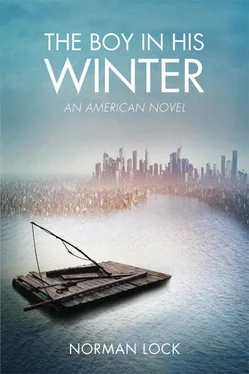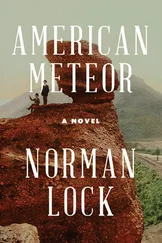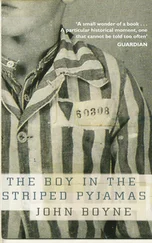Below Plaquemine, there was at that time a mangrove swamp overgrown with cottonwood. Encouraged by its desolate appearance, Jim and I tied up there in order to stretch our legs. As we picked our way into the swamp to conceal ourselves, we heard a cornet playing a music unlike any other we had known. Its novelty drew us farther on into the swamp. How do I explain jazz (for so it was) and the effect it produces when hearing it for the first time? I can’t, except to say it held in its volley of sound a mixture of melancholy and exuberance that thrilled. To listen to it was to be cast down and uplifted, at once. To be dizzied by emotions that, I suspect, were more available to Jim at that moment in our history than to me. That description of jazz is as wide of the mark as a greeting card verse is of a passionate truth. But I doubt I can get nearer. Maybe you can’t with words. Mine anyway. Poets might, but their lines would only approximate the music’s. Go listen to King Oliver or Louis Armstrong play their cornets — then you’ll have an idea of what Jim and I felt among the tangled cottonwoods, but only an idea.
Shortly, we came upon a black man resting on a stump, his horn flashing like a heliograph in whatever light managed to fall from the shifting upper branches of the trees. In the stillness of his deep concentration and in the way the dark green shadows commingled with his own native darkness, he resembled a cemetery monument. A dry stick cracked under my foot, and he promptly turned to me with a fearful look until he saw Jim.
“What’s that you’re playing, mister?” I said.
“Why, that’s ‘St. Louis Blues’ by W. C. Handy. Haven’t you boys ever heard jazz before?”
“No sir,” I said. “We’ve been on the river for quite a spell.”
“Jazz music’s up and down the river,” he said. “I was playing cornet with some black boys on the Natchez when the Dixie Shines came aboard at Donaldsonville. White boys don’t like mixing with coloreds — never mind we swing way better than they do. Last night, them sons of bitches set me down on this island, with nothing except my horn to keep me company.”
“Are you a runaway?” Jim asked, assessing the older man with a narrow look.
“Runaway? Oh, you mean like a slave.”
Jim nodded.
“Ain’t you boys ever heard of the Civil War?”
“We stopped at Vicksburg to see it,” I said casually, pleased by the effect I produced.
The man now eyed Jim and me with mistrust.
“What are you boys?” he asked.
“Just two people floating down the Mississippi on a raft,” I said.
“From where?”
“Hannibal.”
“From when?”
“Eighteen hundred and thirty-five,” I said. “What year is it now?”
“Nineteen nineteen.”
The news surprised neither Jim nor me. We’d already guessed we were traveling in all the dimensions known to humankind at that moment in its history. I’d been reading The Time Machine to Jim, and given our experiences of the past eighty-four years, we deduced that our raft was a time machine of sorts, well suited to a pair of country boys growing up on the river. We had a hard time, however, convincing the man — whose name was Henry Wilson — that we were otherwise than two disreputable con men. When we’d finally overcome his disbelief, Henry showed an eminently practical cast of mind by suggesting we take him with us into the future — at least until we reached a point in time when we might expect human nature to have improved. Jim was skeptical concerning a future golden age, but he agreed. I hesitated because of the cramped conditions aboard the raft. But in the end, Henry Wilson joined us in our southerly journey.
“So, there are no more slaves?” Jim asked him.
“No. The war and Mr. Lincoln’s proclamation put an end to that evil.”
“And you’re a freeman?”
“In some places more than in others,” Henry said wryly.
“Meaning what?”
“In the South especially, a black man must tread lightly if he don’t want to get himself lynched.”
“What’s lynched ?”
“Hung up by the neck from some tree branch or lamppost.”
Jim and Henry spent long hours in conversation, heads bent together, while I made a show — in jealous annoyance — of steering the raft with immense effort and concentration. My exertions were a pretense; the river had a mind of its own, expressed by the current, which was sometimes headlong and at other times contrary. Jim and Henry traded thoughts, the river kept its secrets, and I leaned against the sternpost like a man up against a taproom’s bar without a worthwhile thought in his head.
As we slipped effortlessly downriver, scarcely aware of the Mississippi’s hold on us, Henry told Jim about a war he’d fought in France, at Château-Thierry and at Belleau Wood. He’d been a soldier of the 369th Harlem Hellfighters, a black regiment raised in New York City for the defense of civilization. Henry’s Great War reminded me a little of what Jim and I had seen in the aftermath of the siege of Vicksburg. But mostly, I could form no clear picture of his travail from the words he used to describe it.
He spoke to Jim about garlands of twisted wire hung with dead men and also with living ones who screamed out their agonies until friend or foe could stand it no longer and — in pity or in sudden anger born of an overmastering irritation — shot them, allowing silence momentarily to pour its balm over the devastated ground. Henry spoke about cages of fire falling from the night sky, about poison gas clouds that smelled like geraniums, mown hay, apples, or almonds. He spoke, too, about winter — its gray snows growing minutely on the barrels of machine guns and cannon, on the broken boots, iron helmets, and great coats of the unharvested dead. It might have been a foreign tongue in which he spoke. I understood very little of what Henry said.
You’re right: Henry would never have said this, would not have uttered such high-flown crap. A lyrical turn of phrase — no matter how impassioned — cannot capture cruelty, terror, waste, stupidity, and death. Only plainest speech is apt for the occasion of so much misery. What he might have said, as he leaned against the forward post in his baggy corduroy suit, was this:
“I sat in the rain or snow or stench, in a shitty ditch that was muddy, freezing, or choked with dust, according to the time of year. I pissed myself in fear, played cards or had fistfights out of boredom; I got drunk when I could and prayed to go home. I got no medals or kisses on the cheeks from French generals. Instead, I got lice, crabs — caught the clap once — and spent two weeks in the hospital for trench foot. Lucky for me, I lost only one toe, the little one, which I wasn’t using anyway.”
Maybe. Maybe not. I never went to war, although I did go to a prison, of sorts. I’ve been scared many times, but not as Henry must have been — or Jim would be, before his journey’s end. But you make do with what you’re given, and I’ve spent a good many years learning to write fine-sounding sentences so that I can hide behind them. It’s the way of the hermit crab, with nothing to recommend it but the pretty shell it annexes for its own. Henry scared me — worse; he’d given me the taste of bitterness that comes when you realize the world is irredeemably evil. I wanted him off the raft, as you would someone with a fever, a sickness you’re afraid to catch.
Buzz, buzz, buzz! They spent their time, whispering together like two spinsters — like Miss Watson and the Widow Douglas, whose meanness and piety were unsurpassed. Like flies crawling on the inside of a window, wanting to get out. I got so I hated the sight of their woolly heads. What in hell did they find to talk about all those years?
Читать дальше












